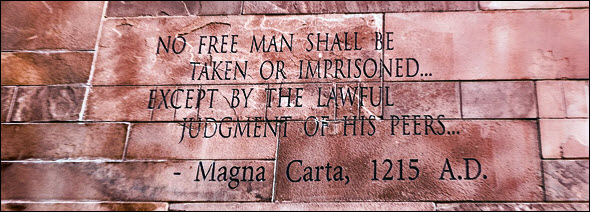Celebrating the law
Take a gander around the Internet today and you’ll see what’s being celebrated.
The Bodleian Library posted about the fact that it has four copies dating from before 1300– “one of which appears to have endured a dramatic encounter with hungry rodents.”1
All of the On This Day-type websites are leading with it in their history selections.2
One wag even said June 15 was chosen as National Beer Day because ale was mentioned in it.3
“It,” of course, is the Magna Carta. Written more than eight centuries ago. Forced on a King 803 years ago today by his barons when he seemed to be ignoring their rights — and the rights of all people — under the law.

Much of what was written in the Magna Carta — in England in the year 1215 — may seem to have little application to us here — generations away in the 21st century and an ocean away in the United States.
Let’s face it: there aren’t a lot of Americans who worry much about the knight’s fee owed to the Crown by the heir of an earl or baron.4 Or the fish-weirs that were in the Thames or other English rivers.5
But some of it still forms the fundamental foundation of our laws:
• “In future no official shall place a man on trial upon his own unsupported statement, without producing credible witnesses to the truth of it.”6
• “No free man shall be seized or imprisoned, or stripped of his rights or possessions, or outlawed or exiled, or deprived of his standing in any other way, nor will we proceed with force against him, or send others to do so, except by the lawful judgement of his equals or by the law of the land.”7
• “To no one will we sell, to no one deny or delay right or justice.”8
Oh, and, yes, standard weights and measures including for wine and ale.9
And we can see its effects in the earliest elements of our laws.
Just as one example, since The Legal Genealogist just finished teaching a week-long course in Georgia, consider the 1777 Georgia Constitution. Here are some of the provisions of that document that might not exist, but for the Magna Carta:
ART. LI. Estates shall not be entailed; and when a person dies intestate, his or her estate shall be divided equally among their children; the widow shall have a child’s share, or her dower, at her option; all other intestates’ estates to be divided according to the act of distribution, made in the reign of Charles the Second, unless otherwise altered by any future act of the legislature.
ART. LIV. Schools shall be erected in each county, and supported at the general expense of the State, as the legislature shall hereafter point out.
ART. LVI. All persons whatever shall have the free exercise of their religion; provided it be not repugnant to the peace and safety of the State; and shall not, unless by consent, support any teacher or teachers except those of their own profession.
ART. LIX. Excessive fines shall not be levied, not excessive bail demanded.
ART. LX. The principles of the habeas-corpus act shall be a part of this constitution.
ART. LXI. Freedom of the press and trial by jury to remain inviolate forever.10
In short, much of what we are as a nation — much of the law we have — much of the record base we have because of the law — can be traced back to the Magna Carta.
And that, to this genealogist, is well worth celebrating.
Lift a glass — with a standard eight ounces — to Magna Carta Day.
SOURCES
- Bodleian Libraries, Twitter post, 15 June 2018. ↩
- See e.g. “Today in History: June 15,” On This Day (https://www.onthisday.com/ : accessed 15 June 2018). ↩
- History Hit, Twitter post, 15 June 2018. ↩
- Magna Carta, ¶ 2; translation, “The Text of Magna Carta,” Fordham University Internet History Sourcebooks Project (https://sourcebooks.fordham.edu/source/magnacarta.asp : accessed 15 June 2018). ↩
- Ibid., ¶ 33. ↩
- Ibid., ¶ 38. ↩
- Ibid., ¶ 39. ↩
- Ibid., ¶ 40. ↩
- Ibid., ¶ 35. ↩
- Georgia Constitution of 1777, in Francis Newton Thorpe, The Federal and State Constitutions Colonial Charters, and Other Organic Laws of the States (Washington, D.C. : Govt. Printing Office, 1909), II: 777, 784-785; digital images, Google Books (http://books.google.com : accessed 15 June 2018). ↩



I have ancestors who were “surety for the Magna Carta.” What does being a “surety” mean?
In this particular context, it means the 25 barons who were entrusted with seeing that the King lived up to his obligations under the document (see clause 61 of the Magna Carta). The meaning is a little different in the usual context (surety for a bond, see “Please release me…“)
You always have the most interesting articles. I don’t know how you find the time to write so many. Cheers for Magna Carta Day!